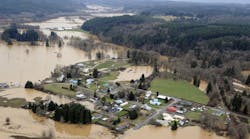
President Obama recently signed a $10 billion bill that authorizes various water projects across the country. Two that have gotten the most attention are helping Flint, MI, recover from the lead-tainted drinking water debacle earlier this year ($170 million authorized), and providing relief to some of the people affected by the California drought ($558 million).
The California measures in the Water Infrastructure Improvement for the Nation (WIIN) Act are particularly controversial. Cutbacks because of the drought have caused many in the state—including farmers—to reduce their water consumption; as a result about 1 million acres of farmland are no longer being cultivated, and the state has lost 35,000 ag-related jobs. The bill allows increased pumping of groundwater during the wet season, some of which can be stored for future use.
Besides providing immediate relief to farmers and communities, the bill will fund long-term projects to make California more resilient to the drought, including water storage and supply projects, flood control, desalination, and water recycling, the White House said in a statement released after the bill was signed.
But criticism is coming from several directions at once. Some in Congress have complained that the bill is an expensive “giveaway” to agricultural interests and businesses in California. Some California farmers have complained that the bill has only a five-year term, and it won’t help them beyond that if the drought is still ongoing. Some who otherwise support the bill grumble about its continued provisions for protecting certain endangered species in California, regardless of drought conditions, saying that the needs of residents and agricultural operations should outweigh the needs of fish. And others—including California Senator Barbara Boxer, who helped draft the bill but ultimately ended up opposing it—say that in its final form, the bill undermines protection for those endangered species and could end up harming the fishing industry.
Other projects throughout the country that the bill is intended to fund include watershed restoration, improvements to waterways and flood control, and upgrades to drinking water infrastructure.
Are you familiar with the bill, and do you think it addresses the right things? Does it do a good job of balancing business, agricultural, and environmental concerns? Does your area stand to benefit from a portion of the funding? Tell us your thoughts in the comments.
About the Author
Janice Kaspersen
Janice Kaspersen is the former editor of Erosion Control and Stormwater magazines.

